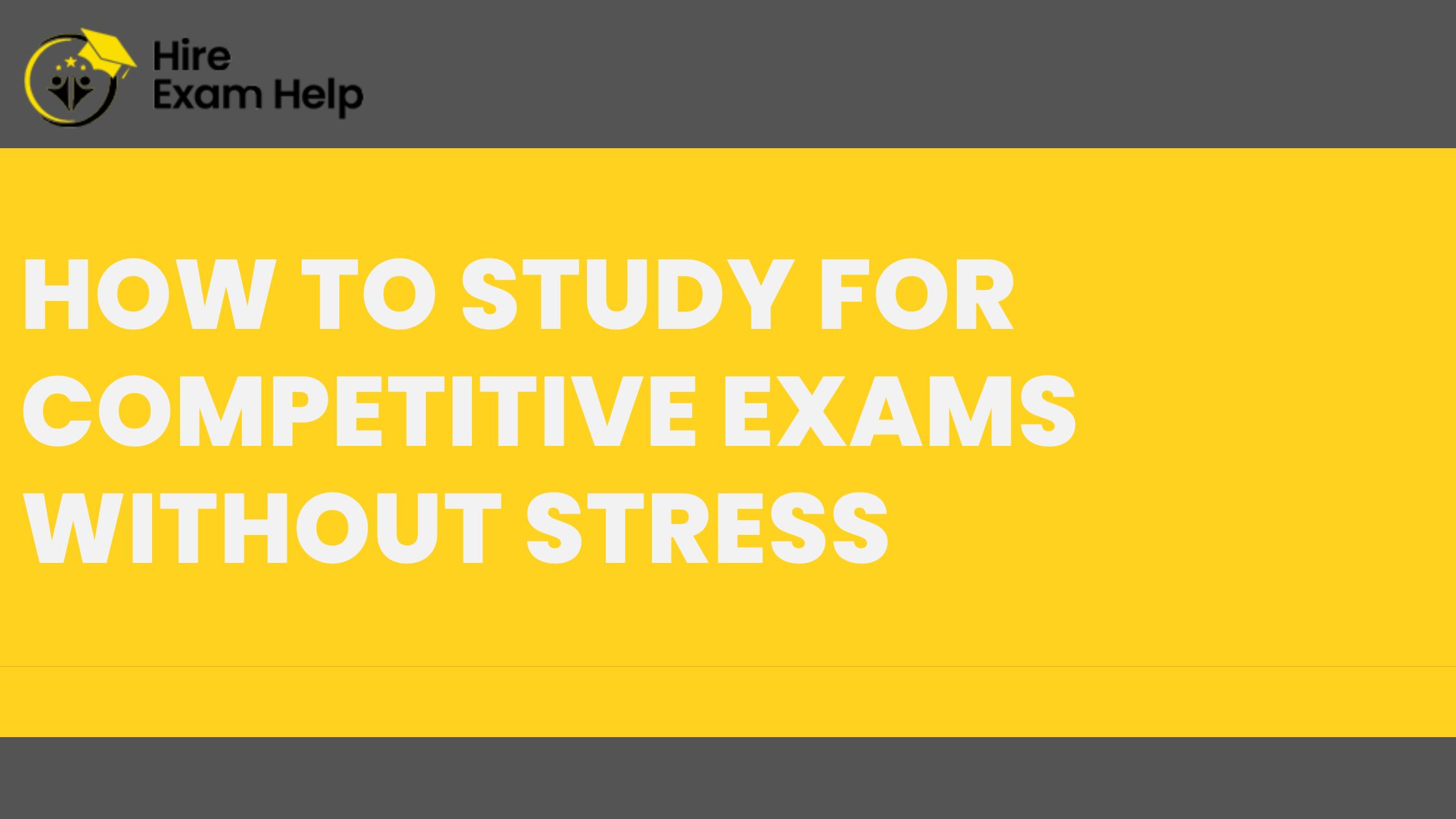


It can be said that going through a process of learning to prepare for competitive exams feels similar to doing a sale with a hundred pounds above your head. In the midst of working hard to succeed as well as just trying to get a grasp of the subjects they have never heard of before, students tend to suffer stresses that completely take over them and triggers that can cause anxiety and panic.
But when you change your attitude, work out a plan and keep to it, acing the exam without passing out is quite possible. This in-depth book will tell you how you can stick to your study routines, keep your stress levels down, and stay sane so that your studying is fun and doesn’t get you down.
Competitive exams are actually meant to measure not only knowledge but also how well a person can apply concepts in a time-constrained environment. These include entrance tests, government job exams, and professional qualification tests. What is different about these exams is their focus on precision, timing, as well as clarity of the concepts.
Most students have difficulty because they treat these exams as any other test, and not as an exam that measures skill set. However, the contest exams are different from school tests as these demand planning and strategic work, unlike school exams. You need to understand the pattern, the grading structure, and the older tendencies in order to make good use of your time and avoid tension. The moment you find out it’s about effectiveness and not about cramming, you will be able to perform better with a lot of ease and more confidence
Stress can come from something good or bad, and it can affect one’s body and mind, simply mentally and physically. When people ignore their minds, an individual will usually have fatigue, forgetfulness, and anxiety, and have during the time of the exam. Therefore, of course, it is impossible to memorise at all if it is a very stressful situation.
Consequently, this becomes a problem when you need to think quickly due to pressure or use clinical problem-solving skills during your exam. But take into account the greater good and just sit the exams, you will enjoy the work that goes into it. In this case, it is also crucial that you manage your stress level; otherwise, you will burn out a few days before the D-day!
Unclear objectives are another major cause of stress. A lot of the students start studying without setting goals for what they want to accomplish in a day or a week. You are telling me that you cannot cover everything at once — and you do not need to.
Split your syllabus into small chunks. Begin to set some feasible goals like “I will finish 2 chapters today” or “I will revise 1 topic every 1 hour”. This will give you a sense of moving ahead and accomplishing, which is a very nice motivation. Students who have practical goals are more likely to succeed, avoiding the stress of the vastness of competitive exams.
A good study plan is the skeleton of stress-free preparation. Don’t pack your plans — we know that consistency beats intensity. Prepare with the fixed duration on a daily basis, and always leave a gap for unforeseen delays and re-revisions.
Begin your day with the hardest material when your focus is paramount, and transition over to simpler topics when your mind is spent. This helps maintain mental balance. Also, insert quick breaks every 45–60 minutes to recharge your attention span. Studying for competitive exams becomes less draining to the mind with a clear and consistent routine.
Challenging competitive exams demand far more than the age-old rote learning. Instead, stick to some time-tested techniques like:
These tricks will help you learn better. These will not only serve to sharpen your knowledge, but they also provide a boost in confidence — when you have prepared enough, it is easier to overcome nerves related to forgetting.
The variation in students’ performance can be attributed to how they allocate their sleep hours. Use a stopwatch when doing your practice exams to ensure that you simulate the real exam setting. What parts are consuming your time, and working on time management to increase speed on those parts? Observe the progress weekly, and change the approaches with the progress. Finally, making the best use of time will help you complete the syllabus systematically without rushing the rush. It works in a way that the process of competitive exams will not look tough anymore.
That stuff called burnout happens to students when they work too hard without taking any time off. The power of more time spent studying equals better results is something as old as the hills, yet still a myth. Too much studying results in fatigue, lack of concentration, and even memory loss.
As a means of enjoyment, insert into your day planner whatever makes you happy; it could be any, like music, a walk, or even just another class with your next-door colleagues. Trailing hours of entertainment facilitate the recovery of your mind. The manner of relaxation is every bit as important as the syllabus. It would be less appropriate to presume that a healthy brain would not provide the best performance for your books.
Of course, there’s nothing wrong with asking for academic or emotional support. The way to go about it, in fact, is to approach your lecturers, colleagues, and anyone else who is able to assist you. Find an online exam help website with study guides, practice tests, and revision plans.
These help make prep easy and provide you with structure to follow, especially if you are doing it by yourself. An ideal support system does not just help you understand better but also keeps you confident and grounded whenever you go through a stressful situation.
How focused you are on your work depends on where you are working from. Find an area, preferably one that is silent, has enough light, and is also comfortable to carry out your studies. Minimize all distractions, such as your mobile phone or social media, when studying.
Prepare all your materials in order to save time rather than having to search around during study time. Positive environments are. Train your brain to connect the environment with focusing on studies, which will have a chain effect on your productivity during competitive exams.
Living healthily makes a significant contribution in carrying out stress-less preparation. Just follow a healthy diet, take in more liquids, and go back to bed early. Late-night studying disturbs your sleeping cycle anyway.
By remaining physically active, such as through yoga or jogging, we make our brains produce the happy hormones called endorphins that counter anxiety. Your body also stands as an essential pillar of good health in that it ensures the focus and stamina, respectively, are both necessary for long hours of study that you are preparing for. It is important to note that preparation for competitive exams requires not only the brain and mind but also the body.
Although highly motivated students still go through anxiety before examinations. But anxiety turns into a problem when it hampers performance. To tackle it, you should:
The more you nourish your mind to stay clam, the simpler it will be for you to combat hurdles confidently at competitive examinations.
Revision isn’t just about going over things time and again—it’s about cementing your grasp on them. Instead of just going over concepts at random, you should prepare a revision chart that highlights your weaker parts.
Revisit concepts, formulas or important points you always forget. Take mocks or online tests on a regular basis to gauge your retention. Regular and systematic revision inculcates long term memory and prepares you to deal with difficult questions with efficiency in competitive exams.
A growth-oriented mindset considers every mistake a lesson learnt and a much-needed jump towards getting better. Congratulate yourself for every achievement or milestone, regardless of its size, that you attain, whether it’s simply passing a subject, or a jump in your mock score; Winners go after baby wins daily. These small wins build momentum, and hey, they take off the pressure of the exam just a little
The most effective learners are those who never confuse the time to study with the time to recline. Working too hard gives you the urge to roll into a ball and end it all, but slacking off makes you want to cry at least a little. If you do it well, you won’t lose your head and want to die at annual assessments whilst improving every day.
Keep a definite timetable for studying, sleeping, or a little fun. Making it the same ensures a level of predictability that is crucial to reducing stress. It turns cramming into a structured, productive routine rather than a scatterbrained, dying forever practice.
Making sure you can clear competitive exams with ease requires a lot of planning, patience, and calmness. Gaining success is not dependent on hours and hours of rote learning; rather, it depends on prudence, composure, and self-faith.
If you prepare taking it seriously with respect, focus, and faith, it just won’t make you excel in writing exams, but you will also love the journey of preparation. Time, feelings, and thoughts — this is the key to effortless studying. So, begin early, be consistent, and believe in your practice.
Divide your study time into focused intervals with short breaks. Use planners or digital tools to track progress and allocate more time to challenging subjects.
Practice relaxation exercises, take short walks, and focus on breathing techniques. If anxiety persists, talk to a mentor or counselor.
Lack of sleep affects concentration, memory, and reasoning ability. A minimum of 7–8 hours of sleep daily ensures better performance.
Yes, they provide personalized study materials, mock exams, and expert guidance to enhance understanding and test readiness.
Begin at least six months before the test date. Early preparation allows time for revision, mock tests, and handling unexpected challenges.
